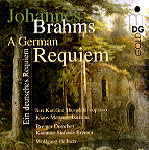On the surface this is a decent enough German Requiem–especially if you prefer this work cast in rather soft-focus acoustics (consonants, where are you?) and performed on the speedy side–a personal rather than score-honoring interpretation. Tempos–faster than either the already-brisk Gardiner or the more resolute, sumptuous, and powerful Blomstedt–at first seem as if they’re going to work in the overall context of Wolfgang Helbich’s rendition. But it isn’t long before you’re questioning the conductor’s reasoning: in the second movement, just where the text admonishes us to “now, therefore, be patient” (So seid nun geduldig. . .), he launches his forces off like the proverbial bat, apparently interpreting the direction for “some” increase in movement to mean “full speed ahead”. Similarly, Helbich chooses to define the Mäßig bewegt indication for the beloved “Wie lieblich sind deine Wohnungen” chorus as a “lively jog” instead of following its literal “moderate” meaning. And instead of adopting a proper “feierlich” (solemn) mood for the opening of the last movement, Helbich seems to prefer it to be cast in the manner of a “Feier” (celebration). I make these points because in every case these seemingly arbitrary conductorial decisions contradict or seriously detract from the meaning of the text and, in the case of the final movement, upset the cohesiveness of the choral parts with the underlying rhythmic figures in the orchestra.
In spite of these drawbacks, the singing is quite good and the orchestra fully measures up to all of Brahms’ demands for virtuoso ensemble playing and skilled, sensitive accompaniment. From a sonic perspective, we occasionally experience a “sum-is-less-than-the-parts” effect, as in the extended fugal climax at the end of the third movement, whose impact is diminished because the sustained loud volume and very busy choral and orchestral textures compete with and ultimately overwhelm each other, making lots of sound but losing most of the detail in the process.
Again on the plus side, this is unquestionably one of the lovelier performances of the fifth movement, with a soloist–Siri Thornhill–who sounds refreshingly comfortable in this difficult soprano aria; and she’s gently, ideally partnered by men’s chorus and orchestra. And we’re also treated to perhaps the most dramatic exclamations of “Wo!” (before the close of the Sixth movement) ever recorded–the three “shouts” are followed by long pauses that triumphantly allow the sound to reverberate, as if to rattle the bonds of hell, awaiting the answer that never comes. Yes, this is an okay Requiem, but it has too many deficiencies to recommend it above–or even on a par with–the vast and impressive competition, beginning with the listed reference recordings and extending to others by Herreweghe, Klemperer, Leinsdorf, Bernius, and Rilling.
































